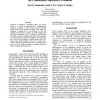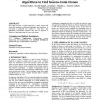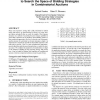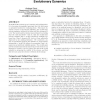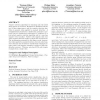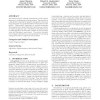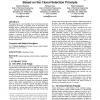115
Voted
GECCO
2005
Springer
15 years 6 months ago
2005
Springer
Interactive evolutionary computation (IEC) has proven useful in a variety of applications by combining the subjective evaluation of a user with the massive parallel search power o...
103
Voted
GECCO
2005
Springer
15 years 6 months ago
2005
Springer
This paper presents a hybrid approach to detect source-code clones that combines evolutionary algorithms and clustering. A case-study is conducted on a small C++ code base. The pr...
129
Voted
GECCO
2005
Springer
15 years 6 months ago
2005
Springer
Many non-cooperative settings that could potentially be studied using game theory are characterized by having very large strategy spaces and payoffs that are costly to compute. Be...
94
Voted
GECCO
2005
Springer
15 years 6 months ago
2005
Springer
In this work we provide empirical evidence that shows how a variable-length genetic algorithm (GA) can naturally evolve shorter average size populations. This reduction in chromos...
103
Voted
GECCO
2005
Springer
15 years 6 months ago
2005
Springer
As artificial life systems grow in number and sophistication, it is becoming increasingly important that the field agree on principled metrics for evaluating them. This report d...
58
Voted
GECCO
2005
Springer
15 years 6 months ago
2005
Springer
101
Voted
GECCO
2005
Springer
15 years 6 months ago
2005
Springer
Negative selection algorithms for hamming and real-valued shape-spaces are reviewed. Problems are identified with the use of these shape-spaces, and the negative selection algori...
103
Voted
GECCO
2005
Springer
15 years 6 months ago
2005
Springer
The authors employ multiple crossovers as a novel natural extension to crossovers as a mixing operator. They use this as a framework to explore the ideas of code growth. Empirical...
113
Voted
GECCO
2005
Springer
15 years 6 months ago
2005
Springer
This paper proposes a new algorithm based on the clonal selection principle for the design of spreading codes for DS-CDMA. The algorithm follows a multi-objective approach, genera...
90
Voted
GECCO
2005
Springer
15 years 6 months ago
2005
Springer
Predicting prospective healthcare costs is of increasing importance. Genetic search is used to discover attribute sets and associated posterior probability classifiers that predi...
